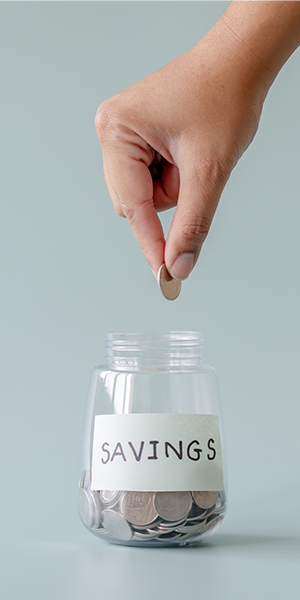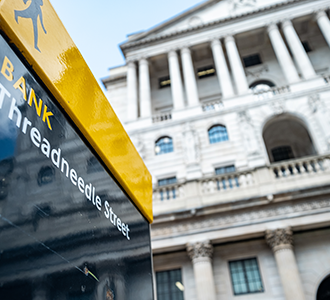All rates subject to change without notice. Please check all rates and terms before investing or borrowing.
A savings account is a great place to store spare money that you don’t need for everyday expenses. Unlike most standard current accounts, savings accounts pay interest on your hard-earned cash – giving it the opportunity to grow. This can help build an emergency fund to cover unexpected costs, save for a specific goal (such as a holiday, major purchase or special event) or simply deter you from spending.
There is a wide range of savings accounts on the market that each suit a variety of needs and circumstances. Compare savings accounts UK providers offer using our chart above or continue reading to find out more.
Although you don’t need a savings account by law, most people will find them a useful way to manage their finances, build up their savings and earn interest on their money.
Savings accounts allow you to separate money that you’re putting aside for the future from your day-to-day spending money that you need for bills and shopping, for example.
If you use your current account for your savings, you may be tempted to spend this money instead of keeping it saved for emergencies, a house deposit, a holiday or any other goals. Furthermore, you would miss out on the higher rates of interest that savings accounts can offer.
You may think it’s not worth opening a savings account if you don’t have a large sum to deposit, but getting into a habit of regularly adding to a savings pot can help to improve your financial stability. By building up your savings, you give yourself a financial cushion if your income drops or if you’re faced with an emergency expense, such as a car repair, which means you may be less likely to turn to expensive forms of borrowing to cover these costs.
Savings accounts pay interest so you can get a better return on your money than if it was in a current account.
Money in a savings account should be protected by the Financial Services Compensation Scheme (FSCS), which covers up to £120,000 that you hold with each provider (or banking group) should it go bust.
They can encourage you to start and develop a regular savings habit.
Building up a decent sum in savings can help you if you need to cover an emergency expense or large purchase in the future.
If you lock your money away in a fixed bond, you won’t be able to access it if you need it for an unexpected expense.
Interest rates on easy access and notice accounts can go down, so the return on your money could be smaller than initially thought.
If you’re currently paying off expensive debt, such as credit card debt, it may make more sense to pay this off instead of putting the equivalent sum in savings.
Saving is an important life skill, as it can improve your financial resilience (equipping you to deal with unexpected circumstances, such as illness, unemployment or a rise in the cost of living). It could also help to make your dreams a reality (for example, going on holiday, retiring early or making a large purchase).
Below are some steps that could help you form a savings habit this year:

Work out how much you can afford to save: Calculate how much money you can feasibly set aside each month by subtracting your regular outgoings from your usual income.

Identify your savings goals: Having a specific goal in mind can help to work out how much money you need to save each month to reach your target. It also gives you something tangible to save towards.

Choose the right savings account: There are many different types of savings accounts to choose from which suit a variety of needs, circumstances and goals.

Read the small print: Whichever savings account you choose, it’s important to read small print carefully, as failing to meet terms and conditions could prove costly.

Automate your savings: If you don’t want the hassle of manually transferring cash to your savings account each month, why not set up a standing order? That way the money is moved automatically in much the same way that other regular payments leave your account. Some providers also offer ‘roundup’ features (that rounds up debit card spends to the nearest £1 and deposits the spare change into a linked savings account).

Review the best rates: It’s important to regularly review the best savings rates (and to consider switching if more competitive returns are available) to make sure you’re earning as much interest as possible – as this could help grow your money faster.
There are several types of savings accounts that you can choose from, depending on your financial situation and savings goals.

Easy access savings accounts, sometimes known as instant access accounts, are the most flexible type of savings account. Many allow you to make as many deposits and withdrawals as you choose, without any restrictions, which can be useful if you want to be able to dip in and out of your savings.
However, bear in mind that some accounts, particularly those paying higher interest rates, may limit the number of withdrawals you can make. Also, these accounts pay a variable rate of interest, which means the rate could change at short notice.

Fixed rate bonds typically pay higher rates than easy access accounts as you agree to lock your money away for a specified period. The rate is guaranteed for the duration of the fixed term.
You will usually only be able to deposit into the account for a limited period after opening and won’t normally be able to access your savings until the end of the term. Fixed rate bonds offer terms ranging from several months to several years.

Notice accounts are like a halfway house between easy access and fixed rate savings. You will often be able to add to these accounts without restriction but, when you want to withdraw any money, you will need to wait until the end of the specified notice period. Notice periods can typically range from 30 days up to six months.

Regular savings accounts may be worth considering if you don’t have a lump sum but instead want to deposit a sum of money into a savings account every month. These accounts typically require you to deposit a minimum amount each month and may set restrictions on withdrawals. Because of the conditions related to these accounts, regular savings accounts can often pay relatively high rates.

Children and teenagers aged under 18 will find there are specific children’s savings accounts available. They may come with certain age limits and allow parents or guardians to manage the account until the child reaches a certain age. There are easy access and fixed accounts available.


Savings accounts and Individual Savings Accounts (ISAs) are both places where you can build up your savings. The main difference between them is that any interest you earn on a savings account above your Personal Savings Allowance (PSA) is taxable, whereas any interest you earn on an ISA is completely tax-free. Read more on the differences between savings accounts and ISAs.
It’s important you don’t confuse regular savings accounts with other sorts of accounts.
As mentioned above, regular savings accounts encourage routine saving, often by imposing a strict set of criteria. For example, you’ll often be required to meet a minimum monthly deposit, there’s normally a limit on the amount you can hold in the account, and you may find access to your cash is restricted. This makes these accounts some of the best savings accounts in the UK for building a healthy savings habit.
However, easy access accounts may be what many would consider a ‘normal savings account’. These more flexible accounts allow savers to add to and withdraw from their pot at any time, and therefore may appeal to those who want to be able to access their cash.
There’s no limit to the number of savings accounts you can have. You may like to have a mixture of accounts, such as an easy access account for any emergency expenses and one or more fixed bonds for your longer-term savings.
No matter what type you’re looking for, discover the best high yield savings account using our charts above.
Savings accounts don’t typically charge any fees as standard.
However, some fixed rate savings accounts and notice accounts may apply certain charges such as:
![]()
A penalty or a loss of interest if you want to withdraw your money before the end of the fixed term period.
![]()
A penalty if you want to close your fixed rate bond before the end of term.
![]()
Some savings accounts are only available if you have a current account with the provider, which may incur a monthly maintenance fee.
If you have an easy access savings account, you will often be able to withdraw your money whenever you like. However, it’s worth bearing in mind that some of these accounts may only allow a limited number of withdrawals per year, otherwise the provider will close the account or pay a lower rate of interest, for example.
For notice accounts, you have to wait until the end of the specified notice period before accessing your money, unless the provider allows earlier access for a penalty charge.
If you have a fixed rate bond, you normally won’t be able to access your money until the end of the term, which is why it’s so important to think about how much you deposit in one of these accounts.
Only interest earned on your savings is liable for tax and, even then, you'll only need to pay tax if you receive above a certain amount of interest within a single tax-year (known as your Personal Savings Allowance).
The threshold stands at:
| Personal Savings Allowance | Income Tax Band |
| £1,000 | ... for basic-rate taxpayers |
| £500 | ... for higher-rate taxpayers |
| £0 | ... for additional-rate taxpayers |
Meanwhile, those on lower incomes (up to £17,570 per year) could earn up to £5,000 on their savings without paying tax on it. See more on our guide on how your savings are taxed.
For example, a basic-rate taxpayer with £10,000 held in an account offering 4.00% AER might take home £400 in interest over the course of the year but wouldn’t face a tax bill as the amount falls within their Personal Savings Allowance. However, if they had a more substantial balance of £30,000, they might receive £1,200 in interest over the same period and would be taxed on the £200 above their allowance.
But, with the Office for Budget Responsibility (OBR) estimating that 4.8 million more people will move onto the higher rate of income tax between 2022/23 and 2030/31, many savers will have a smaller allowance of £500 to contend with. Those being dragged up the tax ladder due to wage inflation and frozen Income Tax bands must prepare to have their allowance slashed and may find themselves paying tax on their savings for the first time.
Calculate how much interest you could earn on your savings (and get an idea of whether you'll be taxed) using our lump sum savings calculator. Alternatively, compare top paying savings accounts today using our chart above. If you're at risk of being taxed on your savings you could consider opening an Individual Savings Account (ISA) which offers tax-free interest.
There’s no one-size-fits-all when it comes to saving, and the best type of account will vary depending on your needs and goals.
Easy access accounts are perhaps the most flexible and can therefore be a good place to build an emergency fund or short-term savings pot (particularly if you’ll need quick access to your cash).
Regular savings accounts typically come with a strict set of guidelines you must follow, and can help to get into the habit of saving.
If you’re worried about interest rates falling, you could secure an interest rate that is guaranteed to remain the same over the duration of a term with a fixed bond (so long as you don’t mind losing access to your cash).
Regardless of which type you choose, the best account will often be that which meets your requirements and offers a competitive interest rate – ideally above the rate of inflation.
If you’re new to saving, an easy access savings account is likely to be the simplest and most user-friendly option. These accounts typically allow you to add to your savings when you choose and make withdrawals if you need to access the money.
However, look out for any accounts that restrict the number of withdrawals you can make or that come with a bonus rate for a limited period, as this could leave you earning less competitive returns in the future. If you’re at the beginning of your savings journey, you might also prefer an account that doesn’t require a large opening deposit.
Instead of an easy access account, new savers may also be interested in a regular savings account. While these typically come with more terms and conditions, they can help to encourage a regular savings habit as they usually require you to deposit a minimum amount in the account each month.
Lifetime ISAs (LISAs) are specifically designed to help people save a deposit for a first home. As well as earning tax-free interest, these accounts apply a generous 25% Government bonus to your deposit.
That being said, there are some drawbacks to LISAs which means they may not necessarily be best suited to everyone saving money for a mortgage deposit. For instance, they can only be opened by those aged between 18 and 39, and impose a £4,000 yearly limit on deposits. Furthermore, when used to purchase a first home, the property must be worth less than £450,000. Because unauthorised withdrawals from a LISA incur a 25% charge, this means someone accessing their cash to buy a house priced over this threshold would face a penalty.



These flexible accounts typically allow withdrawals at any time and therefore may suit those looking to buy a house in the not-too-distant future – so long as you can resist the temptation to dip into your pot! But, because they offer variable rates that can change with little notice, it’s important to regularly check whether you’re still receiving competitive returns.

If you’ve already saved a lump sum towards a house deposit, you could consider locking it away in a fixed bond. These accounts offer an interest rate that is guaranteed to remain the same over the course of a term (ranging anywhere from a matter of months to five or more years).
However, because most don’t allow access to your cash before the term ends, you must have a good idea of when you’re looking to purchase a property from the outset.

These accounts often offer higher interest rates in exchange for following a strict set of criteria and may appeal to prospective homebuyers struggling to make saving a habit. But, it should be noted most impose a limit on monthly deposits, as well as the overall account balance, which can make it difficult to save an entire house deposit.

ISAs are another way to build a house deposit and may be particularly useful if you’re at risk of paying tax on your savings. Like traditional savings accounts, there are many different types of ISA to consider, including easy access, regular saving and fixed cash ISAs, which all earn tax-free interest.

Those saving for a house deposit over a long period of time (usually five or more years) and who are open to investing could see their money potentially grow further in a stocks and shares ISA. However, it’s vital to understand your capital is at risk when investing and returns are never guaranteed.
Did you know a Lifetime ISA can also be used to set money aside for retirement?
Inflation measures the rate at which costs of goods and services are rising, and can affect how much your savings are worth in real terms.
For example, if the rate of inflation is 4% and your savings account pays just 2%, your money will lose some of its purchasing power (i.e. it won’t be able to buy as much as it did before).
Therefore, it’s crucial to find a savings account that offers an interest rate higher than inflation to make sure your money continues to grow in real terms.
As a rule of thumb, a savings account should pay at least two percentage points above inflation to deliver a positive real return. Although many of the top savings accounts struggle to meet this target, those who fail to seek out a competitive return could find themselves significantly worse off.
Related guide: How does UK inflation affect your finances?
In contrast, deflation occurs when deflation falls below 0%. This means prices have fallen and your money should be able to buy more than the previous year. While savings rates are likely to be very low during periods of deflation, the purchasing power of your money should still increase.
Most standard savings accounts are restricted to those over the age of 18, so new parents looking to set money aside on behalf of their child will need to explore specially designed options, such as the following:
These accounts work in much the same way as a standard savings account but can be opened by or on behalf of a child under the age of 18. While most accounts in this sector offer variable rates and grant easy access, it’s possible to find fixed bonds that pay a guaranteed interest rate over the course of a term. Returns are often comparable to those available to adults.
Alternatively, you can earn tax-free interest on behalf of your child using a Junior ISA (JISA). Children receive an annual allowance of £9,000 to deposit in a JISA which enables adults to contribute to the account without using up any of their own £20,000 ISA allowance.
There are several points you should consider when looking for the best savings accounts for your needs and circumstances:
![]()
This will be one of the most important factors for most savers. The higher the interest rate, the greater return you can get on your savings. Compare the best high interest accounts using our charts above.
Providers may pay different interest rates on different account balances, and accounts will also require a minimum opening deposit that could range from £1 to thousands of pounds.


There are different types of savings accounts available depending on whether you want to be able to dip into your savings or not. For example, easy access accounts may be suitable for an emergency fund, while a fixed bond may be more suitable for your longer-term savings goals.
While some accounts may allow you to deposit as much and as often as you like, other accounts set certain restrictions and conditions. It’s also worth checking the minimum opening deposit that is required to open an account.


Providers offer different methods of managing their accounts, with some only available via mobile app while others give you the option of visiting a branch, for example.
Some accounts pay interest monthly, which could be appealing for those wanting to supplement their income, while other accounts may pay yearly, for example.


Some savings accounts and providers highlight their green or ethical credentials, which may be important for some savers. Similarly, there are Shari’ah compliant savings accounts on the market which pay an expected profit rate, instead of an interest rate like traditional savings accounts.
Some savings accounts are only available to existing customers (such as those who hold a current account with the provider), while others may only be available to those living in certain postcodes or who meet certain criteria, for example.
If you think you may earn more interest than your Personal Savings Allowance, you may want to consider a tax-free cash ISA instead.
In most cases, a good interest rate will be higher than the current rate of inflation, as this is crucial for seeing your money grow in real terms.
If your savings earn less than the rate at which the costs of goods and services are rising, your money loses purchasing power (i.e. the same amount buys less).
Our dedicated guide explains more about inflation and how it affects your finances. When it comes to finding a high interest savings account, UK consumers should regularly check top rate tables (such as the one above).


Savings accounts can be opened in many different ways, including online, in branch, by mobile app, over the phone or by post. However, bear in mind the specific opening method will vary depending on the account and provider.
As part of the application process, you may be asked to supply:
![]()
Personal details, including your full name, date of birth and address history
![]()
Proof of ID, such as a driving licence or passport. (Note: identity checks don’t involve credit checks and won’t affect your credit score).
![]()
A nominated bank account (i.e. another bank account that is ‘linked’ to your savings account to facilitate transactions).
![]()
A minimum deposit (ranging from as little as £1 to £10,000 or more).
Importantly, many providers require you to be a UK resident and may ask you to confirm that the UK is your only country of residence for tax purposes.
A savings platform is a third-party website or mobile app that hosts savings accounts from a wide range of banks and building societies. They shouldn’t be confused with financial comparison websites that simply act as introducers. Examples of savings platforms include Raisin UK, Flagstone and Hargreaves Lansdown Active Savings.
Features of a savings platform:
Access to a variety of savings accounts from different providers, including easy access accounts, fixed bonds and ISAs
A single username and password for multiple applications (i.e. you’ll only need to provide your personal and bank details once when setting up an online account with the platform)
FSCS protection in the event of a partner bank going bust.
Unlike the hassle of applying directly with different providers, platforms enable you to open and manage multiple savings accounts with a single set of login details. While this can make it easier to compare and switch between accounts, bear in mind some platforms may charge fees.
While savings rates have steadily been declining, many accounts still offer higher rates than in previous years. This means anyone who hasn’t recently reviewed their savings and switched accounts may be earning a below-average rate of interest.
For example, if you’ve put your money in a savings account with your current account provider for convenience, you could be missing out on significant amounts of interest.
The good news is that it’s easy to open a new savings account and switch to a higher rate.


When choosing a new savings account, it’s important to think about what you want to do with your savings. For example, if you have a lump sum that you won’t need to access for several months or more, you may want to look at locking in a rate with a fixed bond. Alternatively, if you want to have access to your savings so you can dip into them in case of an emergency, for example, an easy access account is likely to be most suitable.
Once you know the type of savings account that best fits your requirements, you can compare savings rates and other account features on our charts. They’re regularly updated to show the most competitive savings rates today, as well as other features such as management methods and opening requirements.
Keep in mind that some of the most competitive savings rates can often be found from challenger banks. Unlike the UK’s biggest high street brands (which can rely on a loyal customer base for deposits), these smaller retail banks usually pay attractive rates to entice new customers and generate brand awareness.
Although you may be less familiar with their name, rest assured that all the challenger banks listed on our charts are protected by the FSCS – just the same as high street banks and building societies – meaning your money is protected should the provider go bust.
If you’ve found a savings account with a higher rate of interest, you can then move money from your existing account into the new account. Bear in mind that, if your savings are locked into a fixed rate bond, you may need to wait until the end of the term before switching.
After you’ve moved your savings to a higher-paying account, that’s not the end of the job. You should regularly review the rate paid on your savings account (particularly if it’s a variable account as providers may change the rate) and compare it with the top savings rates on the market to ensure you’re still getting a competitive return.
While it’s good practice to review your savings portfolio on a regular basis, it’s also important to keep an eye on the wider market.
For instance, look out for when the Bank of England’s Monetary Policy Committee (MPC) meets a minimum of eight times a year to review the central UK interest rate. Also known as the base rate, this is how much the Bank of England charges other banks and building societies to borrow money which, in turn, influences their own pricing.
During periods of high inflation, the Bank of England might try to dissuade spending and encourage saving by raising the base rate. This often has the knock-on effect of making mortgages more expensive and savings accounts more fruitful.
Related guide: What is the Bank of England base rate and what does it mean for your money?
For example, returns on savings skyrocketed after the UK base rate was increased 14 consecutive times between December 2021 and August 2023 as the Bank of England attempted to control rampant inflation.
While average savings rates have since cooled following five base rate reductions between 2024 and August 2025, many remain higher than seen in the recent past.
Whether savings rates continue to trend downwards will largely depend on if the Bank of England can keep inflation in check, which would pave the way for further base rate cuts. That being said, providers usually consider more than just the base rate when setting their pricing and some may even buck the trend to entice deposits. It’s therefore wise to regularly compare top savings rates and consider switching when more competitive returns are available.
The best account is likely to be one that offers the most competitive rate while meeting any other requirements you may have. Although a particularly high interest savings account may appeal, it’s important to take note of other factors such as how often interest is paid and whether there are any penalties when it comes to accessing your cash.
When looking at savings accounts, interest rates comparison charts can help you find the best returns. However, our charts above also provide additional information on account features; find an account that best suits your needs by simply selecting ‘view further details’ next to a listing.
The interest rate on a savings account tells you how much of a return you can get on your savings. To help you compare accounts, the interest rate is displayed as an annual equivalent rate (AER), which tells you how much you could earn over the course of one year including any compounding interest or bonuses, for example.
Interest can be paid in a variety of ways on a savings account, depending on the individual account and provider.
Savings interest can be paid daily, monthly, quarterly, yearly, on anniversary or on maturity, for example. Accounts may give you a choice of how you want your interest paid, while others will only offer one option. Not only can you use our charts to compare the best savings interest rates today, but you can also find out how often interest is paid.
The best type of savings account for a teenager depends on their age. Although some savings accounts come with no minimum age requirements, others are restricted to those over 16 or 18 years old (for product-specific information, select ‘view further details’ next to a listing on our charts).
However, there are still plenty of options for teenagers under the age of 18 who want to start saving. Children’s savings accounts, for instance, are purpose built for anyone under the age of 18 and can offer either fixed or variable rates. While some teenagers will be old enough to apply for their own account, others may require a parent or guardian to open an account on their behalf.
Like adult savings accounts, the Financial Services Compensation Scheme (FSCS) protects up to £120,000 held in children's savings accounts (but, keep in mind this limit is shared if across any accounts you hold with providers that operate under the same banking licence).
Teenagers (and children of all other ages) are also liable to pay tax on the interest taken home from their savings and receive the same personal allowance as adults. Furthermore, parents may also find themselves inadvertently needing to pay tax if money they deposit in their child’s account earns more than per year and they have exceeded their own Personal Savings Allowance. Therefore, teenagers and parents concerned about the potential tax implications of saving could consider opening a Junior ISA which pays tax-free interest on deposits of up to £9,000 per year.
A children’s savings account is the only account that a grandparent can open on behalf of their grandchild (so long as they have proof of the child’s identity, such as a birth certificate). The best children’s savings account will be that which offers the most competitive rate while meeting any additional needs and requirements.
While JISAs may be a more tax-efficient option, they can only be opened on behalf of a child by a parent and/or guardian. That being said, grandparents can still contribute to the account without using up their own annual ISA allowance (but must bear in mind the overall £9,000 JISA subscription limit).
Meanwhile, grandparents can also buy Premium Bonds as a gift for their grandchild; find out how this popular savings product compares with our guide to savings accounts vs Premium Bonds.
Whether you have to give notice before withdrawing from your savings depends on the type of account you have. You don’t need to give notice on easy access savings accounts, but you do if you want to withdraw from a notice account.
Notice accounts come with different notice periods, ranging from as little as seven days to over 90 days. This is the length of time you’ll have to wait after requesting the withdrawal before receiving your money.
All savings providers should be regulated by the Financial Conduct Authority (FCA) and, under the Financial Services Compensation Scheme (FSCS), up to £120,000 of the money you have saved with a provider is protected if it goes bust. Bear in mind that if one or more providers share a banking licence, this limit applies to your total deposits with these providers.
However, with many savers now choosing to open savings accounts online, it’s important you understand how to safely use digital banking. Brush up on your knowledge with our guide on the safest way to bank online.
The best savings account for a large sum of money is likely to be that which offers the highest interest rate while still meeting any other requirements you may have. However, it’s important savers with a big deposit take care not to exceed the £120,000 protection limit offered by the Financial Services Compensation Scheme.
Those looking to save more than £120,000 may want to spread their cash across a number of accounts (so long as the providers operate under different banking licences) to make sure it’s covered if their bank or building society were to go bust. Alternatively, they could consider an account from the Government-backed brand, National Savings & Investments (NS&I), which guarantees 100% of savings (but should be sure to check whether these offer a competitive interest rate!).
Savers with a large sum should also think about how much interest they’re likely to earn, as they’ll pay tax on any returns above their Personal Savings Allowance. While ISAs offer a tax-free savings solution, bear in mind you can only deposit up to £20,000 across these accounts each year.
Yes, if you want to manage your savings via mobile, you can choose an account that allows you to do this. There are providers that operate solely via mobile app, while other providers may allow you to open and manage your account via a number of methods, including mobile, online and in branch.
When you compare savings accounts on our charts, you can see the different ways that you can open and manage each account.
It’s possible to open or apply for savings accounts on behalf of someone else through a Power of Attorney. However, different providers have different rules and processes, so it’s worth researching your options if this is something you want to do.